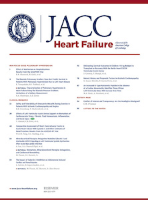
JACC-Heart Failure
Scope & Guideline
Pioneering Research in Cardiovascular Health
Introduction
Aims and Scopes
- Heart Failure Management Strategies:
The journal covers clinical trials and studies focusing on the management of heart failure, including pharmacological interventions, device therapy, and rehabilitation approaches. - Epidemiology and Risk Factors:
Research on the epidemiology of heart failure, including the identification of risk factors, comorbidities, and social determinants of health that influence patient outcomes. - Innovative Therapies and Technologies:
Exploration of new therapeutic strategies, including the use of sodium-glucose cotransporter inhibitors, novel devices, and digital health technologies for heart failure management. - Patient-Centered Care:
Emphasis on the importance of patient-reported outcomes, quality of life assessments, and the integration of patient preferences in heart failure treatment plans. - Guideline-Directed Medical Therapy (GDMT):
Studies focusing on the implementation, adherence, and optimization of GDMT in diverse populations, including challenges faced in clinical practice. - Health Disparities in Heart Failure:
Investigation into disparities in heart failure care and outcomes based on race, ethnicity, gender, and socioeconomic status.
Trending and Emerging
- Digital Health and Telemedicine:
A significant increase in studies exploring the use of digital health technologies, telemedicine, and remote patient monitoring for managing heart failure, especially post-COVID-19. - SGLT2 Inhibitors and Heart Failure:
Growing research interest in the application of SGLT2 inhibitors for heart failure management, highlighting their benefits beyond diabetes control and their impact on heart failure outcomes. - Comorbid Conditions and Integrated Care:
Emerging focus on the management of comorbidities alongside heart failure, particularly in relation to chronic kidney disease, obesity, and mental health, emphasizing a holistic approach to patient care. - Health Equity and Social Determinants of Health:
Increasing attention on health disparities and social determinants affecting heart failure outcomes, driving research that seeks to address inequities in access to care and treatment. - Personalized Medicine Approaches:
A trend towards personalized treatment strategies in heart failure, incorporating genetic, phenotypic, and biomarker data to tailor therapies to individual patient needs.
Declining or Waning
- Traditional Heart Failure Biomarkers:
Research on conventional biomarkers like BNP and NT-proBNP is seeing a decline as newer, more comprehensive diagnostic approaches and biomarkers gain traction in heart failure management. - Invasive Procedures for Diagnosis and Management:
There is a noticeable decrease in studies centered on invasive procedures, such as routine cardiac biopsies or catheterizations, as non-invasive and remote monitoring technologies are increasingly preferred. - Single-Factor Studies:
Research focusing solely on single interventions or factors in heart failure is declining in favor of multi-faceted approaches that consider the complexity of patient care and the interaction of various treatment modalities.
Similar Journals
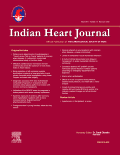
Indian Heart Journal
Bridging Gaps in Cardiovascular UnderstandingIndian Heart Journal, published by Elsevier, is a distinguished peer-reviewed journal dedicated to the field of cardiology and cardiovascular medicine. Founded in 1961, this journal has been a pivotal resource for researchers, healthcare professionals, and students, providing a platform for innovative studies and insights into heart health. The journal transitioned to an Open Access model in 2013, ensuring widespread dissemination of vital research findings to enhance global understanding of cardiovascular diseases. Ranked in the Q3 category for Cardiology and Cardiovascular Medicine in 2023, it holds a reputable position in the medical community, with a Scopus rank of #222 out of 387 journals in the same field, placing it in the 42nd percentile. The Indian Heart Journal strives to foster advances in clinical practice and research while addressing the unique cardiac health challenges faced in India and beyond.

REVISTA ESPANOLA DE CARDIOLOGIA
Exploring the Frontiers of Heart HealthREVISTA ESPANOLA DE CARDIOLOGIA is a premier journal dedicated to the dynamic field of cardiology, published by EDICIONES DOYMA S A in Barcelona, Spain. With an impressive Q1 status in the Medicine (miscellaneous) category for 2023, this journal is recognized for its significant contributions to cardiovascular research, evidenced by its rank of #61 out of 387 in the Scopus database, placing it within the top 16% of journals in its field. Covering a broad range of topics within cardiology, the journal aims to disseminate high-quality research, clinical studies, and educational content, fostering knowledge sharing among researchers, clinicians, and students alike. While it does not currently offer open access, the journal maintains a commitment to advancing cardiovascular health through rigorous peer-reviewed articles. With a publication history that spans from 2013 to 2024, REVISTA ESPANOLA DE CARDIOLOGIA is an essential resource for those seeking to stay at the forefront of cardiology advancements and practices.
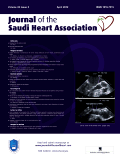
Journal of the Saudi Heart Association
Empowering Heart Health Through Research and CollaborationThe Journal of the Saudi Heart Association is a prominent scholarly publication dedicated to advancing knowledge in the fields of cardiology and cardiovascular medicine. Published by DIGITAL COMMONS BEPRESS, this open-access journal has been serving the global community since 2009, providing a vital platform for researchers, practitioners, and students interested in the latest developments in heart health and disease management. With an ISSN of 1016-7315 and a growing repository of knowledge alongside an E-ISSN of 2212-5043, the journal showcases an array of peer-reviewed articles that contribute to the understanding of cardiovascular conditions. Although categorized in the Q4 quartile for 2023, it remains committed to offering valuable insights, particularly within the constraints of the 29th percentile rank specified by Scopus. As the journal converges towards 2024, it continues to foster collaboration, innovation, and inquiry within the Saudi Arabian and international medical communities.

American Heart Journal Plus: Cardiology Research and Practice
Transforming Cardiology with Accessible KnowledgeAmerican Heart Journal Plus: Cardiology Research and Practice, published by Elsevier, is a prominent open-access platform dedicated to advancing knowledge in the field of cardiology. With an evolving ISSN of 2666-6022, this journal serves as a vital resource for cardiologists, researchers, and healthcare professionals, contributing to the ever-growing discourse surrounding cardiovascular health. With a mission to disseminate high-quality research and innovative practices from 2021 to 2024, it aims to bridge the gap between scientific research and clinical application. Though currently ranked #264 out of 387 in the medicine category for cardiology and cardiovascular medicine, its commitment to quality and accessibility exemplifies the journal's importance in fostering collaboration and knowledge sharing within the medical community. Researchers are encouraged to take advantage of its open-access model to ensure that groundbreaking developments in cardiology are readily available to all stakeholders in the field.
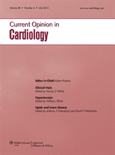
CURRENT OPINION IN CARDIOLOGY
Exploring the forefront of cardiovascular innovation.CURRENT OPINION IN CARDIOLOGY, published by LIPPINCOTT WILLIAMS & WILKINS, is an esteemed journal in the field of cardiology that has been serving the academic community since 1988. With a robust focus on the latest developments and emerging trends in cardiovascular medicine, this journal aims to bridge the gap between clinical practice and research, offering critical insights and expert commentary. The journal is recognized in the medical community, achieving a 2023 Scopus rank of #148 out of 387 in its category, placing it in the 61st percentile. Although it operates under a subscription-based model, CURRENT OPINION IN CARDIOLOGY remains an essential resource for researchers, practitioners, and students seeking cutting-edge knowledge and advancements in cardiology. As a Q2 journal in the field, it continues to foster dialogue and provide a platform for disseminating impactful cardiovascular research, ultimately contributing to improved patient outcomes and informed clinical decisions.
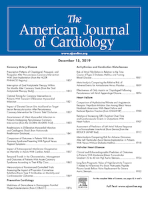
AMERICAN JOURNAL OF CARDIOLOGY
Shaping the Future of Cardiology Through Rigorous ResearchThe American Journal of Cardiology is a leading peer-reviewed journal in the field of Cardiology and Cardiovascular Medicine, published by Excerpta Medica Inc-Elsevier Science Inc. Since its inception in 1958, the journal has consistently contributed to the advancement of cardiovascular research, providing a platform for groundbreaking studies and clinical findings that shape modern medical practices. With an impressive impact factor placing it in the Q1 category in its field for 2023, it ranks among the top journals in medicine, with a rank of #155 out of 387 in the Scopus database, reflecting its significance and rigorous editorial standards. The journal is committed to disseminating high-quality research that fosters innovation and enhances clinical outcomes in cardiology. Although it does not provide Open Access options, the American Journal of Cardiology remains an essential resource for researchers, healthcare professionals, and students looking to deepen their understanding of cardiovascular health.

Current Heart Failure Reports
Empowering Clinicians with Evidence-based InsightsCurrent Heart Failure Reports, published by SpringerNature, is a leading journal dedicated to advancing the field of cardiology, specifically focusing on heart failure. With an impressive impact factor and a recognized reputation, this journal falls under the top quartiles in several categories, including Q1 in Cardiology and Cardiovascular Medicine and Emergency Medicine. Its range of topics encompasses both clinical and research insights into heart failure management, offering valuable perspectives aligned with the latest therapeutic advancements. Although it does not have open access options, researchers and practitioners can find profound studies and reviews aimed at improving patient care and outcomes in cardiovascular health. As the journal converges towards its 20th year in print, it continues to serve as a critical resource for academic professionals, providing a platform for high-quality research that shapes the future of heart failure treatments.
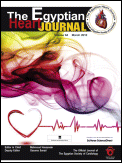
Egyptian Heart Journal
Discovering solutions for a healthier heart, one article at a time.The Egyptian Heart Journal, published by Springer, is a premier open-access journal dedicated to advancing the field of cardiology and cardiovascular medicine. As of 2023, it holds a Q3 classification within the category, showcasing its growing influence within the research community, and ranks 241 out of 387 in Scopus, reflecting a 37th percentile position. With an E-ISSN of 2090-911X, this journal has been open access since 2011, making it easily accessible to researchers, practitioners, and students alike. The journal aims to disseminate high-quality research articles, reviews, and case studies that contribute to the understanding and treatment of cardiovascular diseases. With its focus on innovative and practical solutions in cardiology, the Egyptian Heart Journal plays a critical role in shaping current and future cardiovascular research. Its global outreach and commitment to open access ensure that vital information is available to a wide audience, enhancing both scholarly discourse and clinical practice in the evolving landscape of cardiovascular medicine.
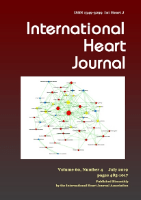
International Heart Journal
Transforming Heart Health Through Open Access ResearchInternational Heart Journal, published by INT HEART JOURNAL ASSOC, serves as a pivotal platform for research and discourse in the fields of cardiology and cardiovascular medicine. With its ISSN 1349-2365 and E-ISSN 1349-3299, this esteemed journal is based in Japan and is located at the University of Tokyo, Graduate School of Medicine, Department of Cardiovascular Medicine. Since its inception in 2005, International Heart Journal has blossomed into a respected publication with an impact factor that signifies its growing relevance, ranking in the Q3 category of both cardiology and miscellaneous medicine as of 2023. This journal not only disseminates vital research findings but also fosters collaboration among researchers and healthcare professionals. Notable for its Open Access options, it ensures the availability of its content to a broader audience, thereby enhancing knowledge transfer and innovation in cardiovascular care. With an ongoing commitment to improve clinical practice and patient outcomes, the journal continues to be an essential resource for those dedicated to advancing the understanding of heart health and disease.
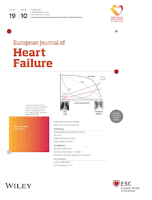
EUROPEAN JOURNAL OF HEART FAILURE
Empowering clinicians with cutting-edge heart failure knowledge.The European Journal of Heart Failure, published by Wiley, is a premier international journal dedicated to advancing the field of cardiology, specifically focusing on heart failure research and clinical practices. With an impressive impact factor and ranked in the top 1% of journals in Cardiology and Cardiovascular Medicine according to Scopus rankings (Rank #7/387, Percentile 98th), this journal serves as a vital resource for researchers, clinicians, and students alike. Spanning from 1999 to 2024, the journal has established itself as a cornerstone for innovative research, comprehensive reviews, and clinical insights, fostering a deeper understanding of heart failure mechanisms, management, and treatment strategies. Although not an open-access journal, the European Journal of Heart Failure remains committed to disseminating high-quality, peer-reviewed content that contributes significantly to the global cardiovascular community. Located in the United States at 111 River St, Hoboken, NJ 07030-5774, it continues to play an essential role in shaping the future of heart failure management.